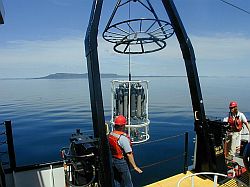Our understanding of the fate and transport of pollutants and of long-term impacts of humans on
the environment is limited by an incomplete understanding of environmental chemistry.
Environmental chemistry seeks to apply the principles of physical chemistry, inorganic and
organic chemistry, biochemistry, electrochemistry, and analytical chemistry to the complex
milieus encountered outside the laboratory.
 A host of environmental problems today are not
confined to any one medium (air, soil, water) but are characterized by dynamic transfers among
media. The interdisciplinary study of environmental chemistry aims to prepare students to
understand the fundamental principles governing pollutant transport and transformation in all
environmental settings. Further, a major thrust in environmental research is pollution prevention,
the changing of industrial and social practices so as to prevent pollution and obviate the need for
environmental remediation and end-of-pipe treatments. A host of environmental problems today are not
confined to any one medium (air, soil, water) but are characterized by dynamic transfers among
media. The interdisciplinary study of environmental chemistry aims to prepare students to
understand the fundamental principles governing pollutant transport and transformation in all
environmental settings. Further, a major thrust in environmental research is pollution prevention,
the changing of industrial and social practices so as to prevent pollution and obviate the need for
environmental remediation and end-of-pipe treatments.
Pollution prevention requires an
in-depth knowledge of environmental chemistry to define what
constitutes "safe" emissions, and to search for new synthesis
pathways that use environmentally-friendly starting materials.
The focus on chemistry is not intended to minimize the role
of physical and biological processes, but rather to further
our limited understanding of the chemical principles that, together
with physical and biological processes, determine the environmental
conditions in which we must find a sustainable way to live.
 Faculty
and students in environmental chemistry have specializations
in the areas of atmospheric chemistry, water chemistry, organic
chemistry, and geochemistry. Common to all of these areas
of specialization are an understanding of thermodynamic and
kinetic principles, reaction mechanisms, and the complexities
that define each environmental medium. The areas of specialization
primarily define the particular boundary conditions under
which the chemical principles are applied. Faculty
and students in environmental chemistry have specializations
in the areas of atmospheric chemistry, water chemistry, organic
chemistry, and geochemistry. Common to all of these areas
of specialization are an understanding of thermodynamic and
kinetic principles, reaction mechanisms, and the complexities
that define each environmental medium. The areas of specialization
primarily define the particular boundary conditions under
which the chemical principles are applied.
Examples of current research programs include:
- Studies of reductive dehalogenation of common environmental
pollutants
- Studies of human impacts on tropospheric ozone and reactive
nitrogen oxides and the chemistry of the rural and remote
atmosphere
- Examination of the role of organic sulfur species in binding
with trace metals; this binding can either immobilize the
trace metals, or, under special circumstances, facilitate
their transport
- Examination of the chemical methods used by bacteria to
detoxify trace metals (Hg) and xenobiotic organic compounds
- Development of predictive models for the rates of transformation
and adsorption of xenobiotic chemicals
Use the
contact form to make an inquiry
if you
are interested in this field.
|

